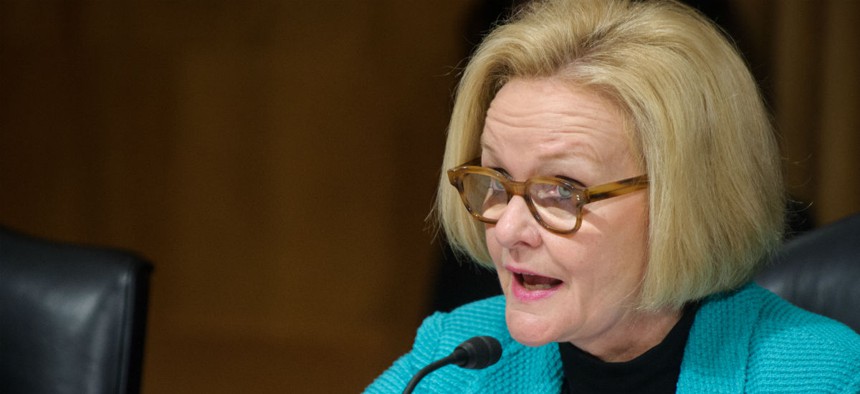
Sen. Claire McCaskill, D-Mo., is seeking answers from OMB on the Trump administration's decision to contradict some initial agency requests. Flickr user Senator Claire McCaskill
Senator Asks White House to Explain the Logic Behind Its Proposed Federal Pay Freeze
DHS had asked for a pay increase for its workers, but OMB turned it down.
The Senate’s top Democrat with oversight of the federal workforce pressed the White House to explain its proposed pay freeze for civil servants in 2019, as part of a series of questions asking how the Trump administration rationalized some stark differences with initial agency requests in its forthcoming budget.
In a letter, Sen. Claire McCaskill, D-Mo., ranking member of the Homeland Security and Governmental Affairs Committee, asked Office of Management and Budget Director Mick Mulvaney to “please explain OMB’s rationale for proposing a pay freeze for all federal employees, including law enforcement officers.” The proposal first came to light after McCaskill published “passback” documents from OMB to the Homeland Security Department exchanged as part of the fiscal 2019 budget planning process.
McCaskill asked about a series of personnel issues at DHS, such as why OMB pushed the department to hire 1,000 more Immigration and Customs Enforcement agents than it requested and instructed the agency to cut its ask for Customs and Border Protection field operations by $88 million. The senator repeatedly asked the White House’s budget office for the data, metrics and cost-benefit analyses it used to reach such decisions.
Democrats have derided the Trump administration and their Republican counterparts for focusing on staffing between ports of entry rather than at them, saying it would lead to long lines for travelers and importers and inhibit illicit drug screening efforts. Trump’s fiscal 2018 budget had called for an increase of just 63 CBP officers to support National Targeting Center operations. For now, CBP has said the agency is focusing on filling the 1,200 positions still vacant from hiring authorized in 2014.
McCaskill also questioned DHS on its disagreements with OMB. In a separate letter to DHS Secretary Kirstjen Nielsen, McCaskill asked the secretary if she supported the pay freeze and how it would affect retention and hiring initiatives at the department. McCaskill also asked Nielsen if she supported the proposed cut to CBP’s Office of Field Operations and how the component would be able to fill vacant positions there. The senator asked the secretary to explain the disparity between the 1,000 ICE agents she requested versus the 2,000 agents for which OMB instructed the agency to budget and for details on whether the agency would have the resources to recruit and screen the higher number of agents.
The passback documents appeared to highlight other differences on Trump’s signature issues, such as his proposed wall along the U.S.-Mexico border. McCaskill asked both Mulvaney and Nielsen to explain why OMB rejected $175 million in border security technology and instead pushed for $1.6 billion in wall funding. The senator noted DHS had originally asked for just $900 million for the wall.
McCaskill suggested to Nielsen that OMB’s direction for the department “appears to stand in contrast to some of your stated policies for the department.” Among those was the pay freeze, which McCaskill said directly opposed DHS’ suggested pay raise. Democratic lawmakers generally, as well as a few Republicans, have denounced the freeze proposal, saying it would be devastating to recruiting the next generation of civil servants.
Federal workers last saw their pay frozen under President Obama in 2013, the final leg of a three-year moratorium on annual increases in government salaries. Trump signed off on a 1.9 percent boost for 2018, which went into effect in January. OMB did not respond to inquiries regarding its rationale for the pay freeze or McCaskill’s other lines of questioning.
The White House will release its budget, which is expected to formalize the pay freeze proposal, on Feb. 12.
NEXT STORY: Tax Assessments







